SDC EC organized a half -day Seminar with the ultimate goal to create awareness and sharing of knowledge towards eco-textiles and circularity in fashion. It is the need of the hour leading to a positive impact on people and the planet through the principles of an ideal circular economy being be high on every one’s agenda. The seminar was a platform for networking between industry and academia The seminar began with lighting of the lamp invoking the blessings of the Almighty for success in our endeavours at SDC EC India and everybody.

The Welcome Note was delivered by Mr. Sandeep Singh (Hon. Vice Chairman SDC EC) who briefly explained the need of this very important topic on Eco textiles and Circularity in Fashion.
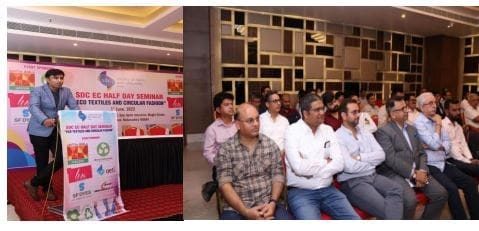
Welcome Address
Chief Guest- Mr. Kailash R. Lalpuria, Executive Director and CEO, Indo Count Industries Ltd. described that Sustainability is a necessity today and needs to become a part of our lives in all actions policies and management. Textile Processing is the key to our Textile and Fashion Industry; hence it is imperative that we focus on integrating values of sustainability and circularity at this point itself. Earlier sustainability was symbolic and seemed abstract but today it is the core of value chain. Earlier it was looked upon as additional cost today it is looked upon as an added value to the product or process. It is vital that industries embrace sustainability and new ideas in that direction to stay ahead as players in the global scenario.
Brands are building their foray and positioning into sustainability. They are participating in eco-friendly initiatives. Eco friendliness, organic, circularity is becoming integral to their thoughts, processes and strategies. Communication with consumers is imperative on these lines. People understand concepts of health hygiene, wellness etc. and look up to brands that can deliver goods that fulfil address these concerns.
Resiliency agility and quick response systems are required to combat global competition, at the same time it is important to understand consumer behaviour patterns. It is required that we may have to breakthrough some traditional concepts and processes that are not suitable for today’s times of sustainability. It is required that we keep open minds to new innovations so that we are not left behind in the race by keeping consumer satisfaction and
sustainability on our priority.
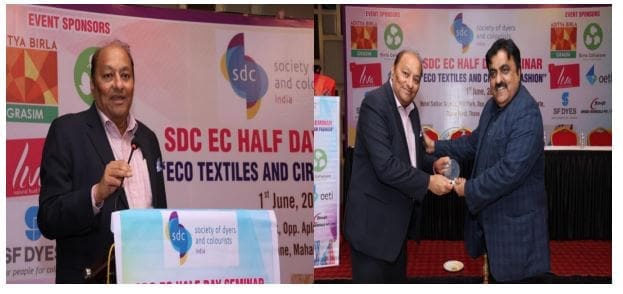
Address by Chief Guest
Mr. Anjani Prasad, Managing Director Regional Vice President-South Asia, Archroma India Pvt. Ltd. & Chairman of SDC EC India emphasized the role CSR in integrating sustainability into value chains. The agro-industry is the primary focus and there is tremendous scope for fibres, pulp, bagasse, etc., polyester recycling, use of hemp, garment and fibre recycling, etc. are some focal areas for research, innovation and are at the economic threshold to bring economies to develop at fast pace.
For these innovations we need suitable chemistry, machinery and mechanisms that can help integrate sustainability into our processes. Digital technology and the allied spaces including 3D printing, sensor technologies, physiological testing, thermodynamic properties of clothing, are also becoming a challenging and dynamic field to lead to super specialization. Research Institutes, mills and industries need to work in collaboration and take concrete steps
to make sustainability a reality.
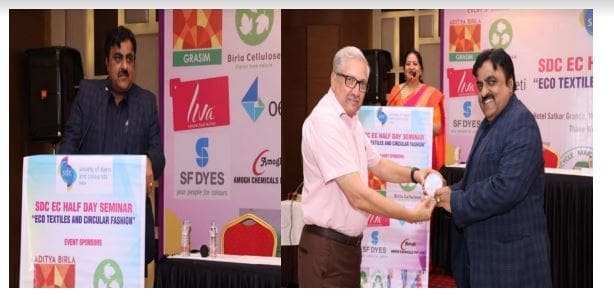
Address by Chairman of SDC EC
Keynote Speaker – Ms. Leonie Vaas, Head of Sustainability and Sustainable Innovation, Hayleys Fabric PLC. brought to light the growing concern for eco-textiles and circularity in fashion. There was a proliferation of petroleum-based fibres that caused damage to the industry. Linear economy (Take make use and dispose) has to move towards becoming a circular economy (Refuse, Reduce, Reuse, Repurpose and Recycle). She described some of the ways and means that one can adopt sustainability and bring about circularity in fashion through concerted research and innovation. Some key concepts of Circular economy, Impact Assessment, Design for Circularity, Responsible Sourcing. Circularity in mindsets, Use of Natural Dyeing with Mahogany, Charcoal Black etc., Trace the Grace Initiative, steps to educate students many other strategies towards sustainability and circular fashions were
elaborated.
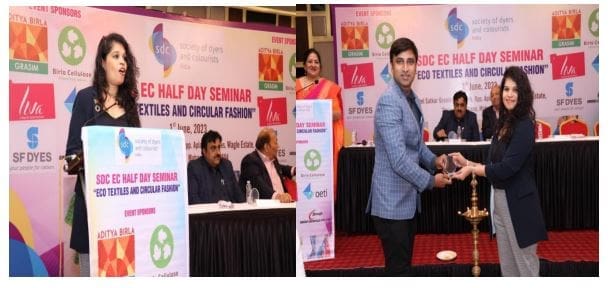
Keynote Speaker
The First Panel Discussion was moderated by Mr. Manmohan Singh – Chief Marketing Officer, Grasim Industries Limited. The Panel comprised of Mr. Aneel Murarka – Managing Director, Mirachem Industries, Ms. Bhavini Parikh – Founder/CEO, Bunko Junko, Mr. Dhruva Singh Chauhan – Chief Business Officer – Suitings, Raymond Ltd., Ms. Raju Bhatia – Fashion Consultant and Academician, Ms. Suvidha Patil – NAFDI Fashion.
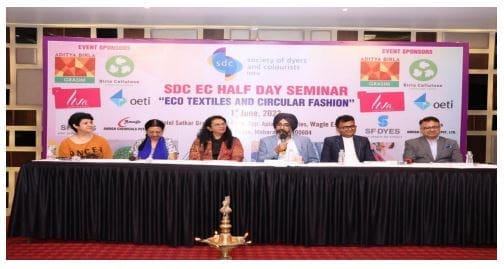
PANEL DISCUSSION 1: FASHION SESSION

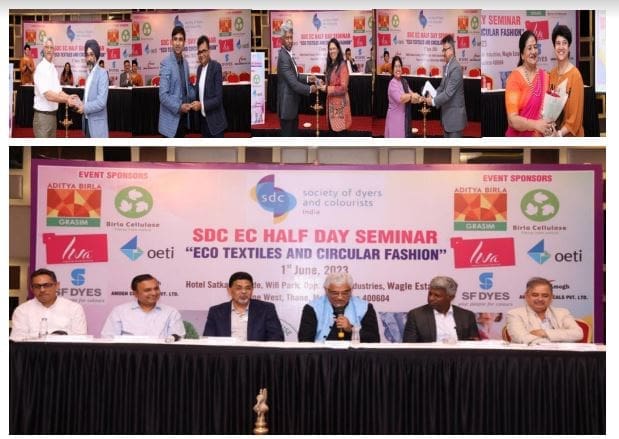
PANEL DISCUSSION 2: TECHNICAL SESSION
The Second Panel Discussion was moderated by Mr. Jayant Khera – Regional Vice President-South Asia, DyStar India Pvt. Ltd. The Panel comprised of Mr. Vignesh Amalraj – Country Manager, Institute for Ecology, Technology and Innovation, Mr. Uday Khadilkar – Senior Vice President (Marketing), Grasim Industries Limited, Mr. Shripad Kher – Founder Director, Amogh Chemicals Pvt. Ltd., Mr. Dhanvant Yeola – Executive Director-Technical, Revalyu Recycling (India) Ltd. and Mr. Janpreet Singh Attar, Director, Mishti Associates
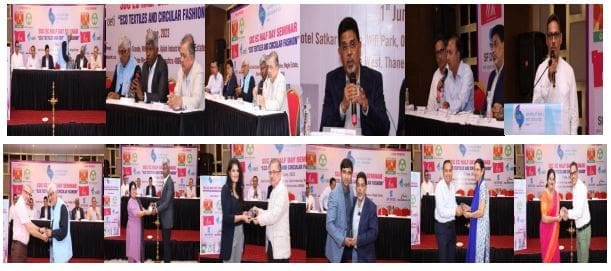
Key insights shared during the two panel discussions:
Wool can be considered as one of the most sustainable fibres. Wool can be processed to suit any end-use by altering its properties and structure. It is one of the most versatile natural fibres that can be woven knitted or made into nonwovens to yield fabrics of any desirable weight and compactness with varied yarns of different counts.
Circularity in Fashion can be brought around by recycling and reusing garments. Garment exchange schemes are ways to help consumers get involved into circularity of goods. Goonj is a non-profit organization where garments are accepted as donation thus reaching post-consumer waste to the needy.
Economy of the nation in the global scenario plays a significant role in realising the goals of sustainability. GOI is gearing strongly towards making sustainability into industrial growth agenda. Regulatory policies devised and implemented in time can help industries forge ahead in aspects of sustainability. Innovations with using renewable energy resources, zero liquid discharge, recycling of pre- and post- consumer waste are the needs of the hour.
Can the fashion industry help reduce carbon footprint? Everybody today is aware that these issues concerning better environment and better world are essential however little is being done and by far are neglected when one thinks of economic profits, targets and fast fashion demand supply. It is high time that perspectives and mind-sets change. There is a need for like-minded individuals, companies from industry, consumers, manufacturers, and key policy-
makers come together to arrive at concrete solutions.
What is the future of recycled fashions? Consumer perceptions are shifting to openness to eco-fashions, recycling and preserving textiles and crafts. They are open now to second-hand clothing to slow-down fashion. Their emphasis is on quality and durability. However, there is a need for more awareness amongst them to increase willingness to adopt these practices of recycled goods. The cost of recycling also has to be studied. Will consumers prefer to purchase recycled products? Are there brands and retailers willing to exclusively deal in recycled goods? Such related questions are put forth. Fashion influencers play a big role in changing the notions of consumers. Programmes based on sustainability awareness and training on best practices to be adopted need to be conducted for various stakeholder groups. There are several international organizations working in this direction.
Traceability of goods, eco-awareness to eco-consciousness has to be a movement. There has to be an inherent desire to make a change. Social and ethical issues are on debate in various forums where intellectuals and experts in the field are proposing ways to bring in sustainability and circularity as the core of the textile and fashion industry. India is in the forefront as traditionally we have grown with a culture to preserve and protect our resources and the environment. There are several promising materials and process innovations that are available and accessible. Cost factors, associated economic and technological viability can act as hindrances. Non-compliance issues are tremendous in the industry and the industry faces challenges meeting ends of high productivity, innovation integration, profit maximisation and sustainable products and processes. Failure in meeting RSL compliances are due to deviations in product specifications and process modifications, where processing industries give in matching the ends.
Almost 50% of goods produced are not sustainable, 2% is reused and 1% is not used at all. Unsold garments are simply dumped from the foreign markets. There is a ban now on dumping unsold garments. Charity to the needy is one of the wisest options to have garments into the consumption cycle without going into landfills. Mechanical recycling of fabric and garment waste is becoming an upcoming trend in the industry with several types of machinery
to shred and recycle waste.
Today, approximately 1.8 billion plastic bottles are discarded every day. A number that keeps increasing. By recycling these we can save 15,000 barrels of oil a day equating to 22,000 kgs. of CO2 saved. Our mission is to grow globally to recycle as many used plastic bottles as possible and limit the amount of PET plastic produced from oil.
Big retailers and brands are promoting sustainability with their names and products.
The question is there is a difference between saying and doing. When discussing sustainability price sensitive markets, confidence and perceptions of customers and the dynamics of markets have to be fully understood. Dye-house effluent treatment is crucial. The coloured effluence interferes with the photosynthesis of aquatic algae. Minimising the use of dyes, auxiliaries, salt and water is very important. Dyestuff biodegradability is also to be checked. Use metal complex dyes, toxic chemicals and metal salts has to be eliminated hence suitable alternative
chemicals and auxiliaries are being researched into.
Operations management and measurement of process and production parameters. For example, maintaining the boiler temperature, maximised utilization of cartridge ink for digital printers, cut waste in fabric cutting units. We need to think of ways to implement preventive measures for reasons of health and safety. In most cases ignorance results in accidents and carelessness results in calamities. Hence it is most important that awareness programmes for personnel followed by stringent implementation is a requirement for successful sustainability management.
The success of the event is owed to the sponsors of the event and delegates who participated in large numbers and who actively deliberated on the key issues of sustainability and circularity in fashion. The programme was compered by Dr. Pratima Goyal (Treasurer, SDC EC), Dr. Khushboo Shrimali (SDC Member) and Dr. Vishaka Karnad (Hon.
Secretary, SDC EC). The sessions culminated with felicitation of Sponsors, Speakers and Guests. The SDC EC Trustee Board members express their deep gratitude to its supporters and well-wishers. The Seminar was a very good platform for interaction and networking with academia and industry to share some valuable ideas on sustainability and circularity in fashion.
Special thanks to the Event Sponsors for collaborating and supporting our endeavors in promoting sustainability in textile and fashion industry.
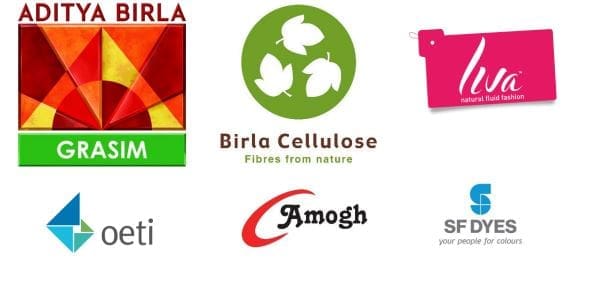
On behalf of SDC EC:
Reported by– DR. VISHAKA KARNAD, (SDC EC HON. SECRETARY)

